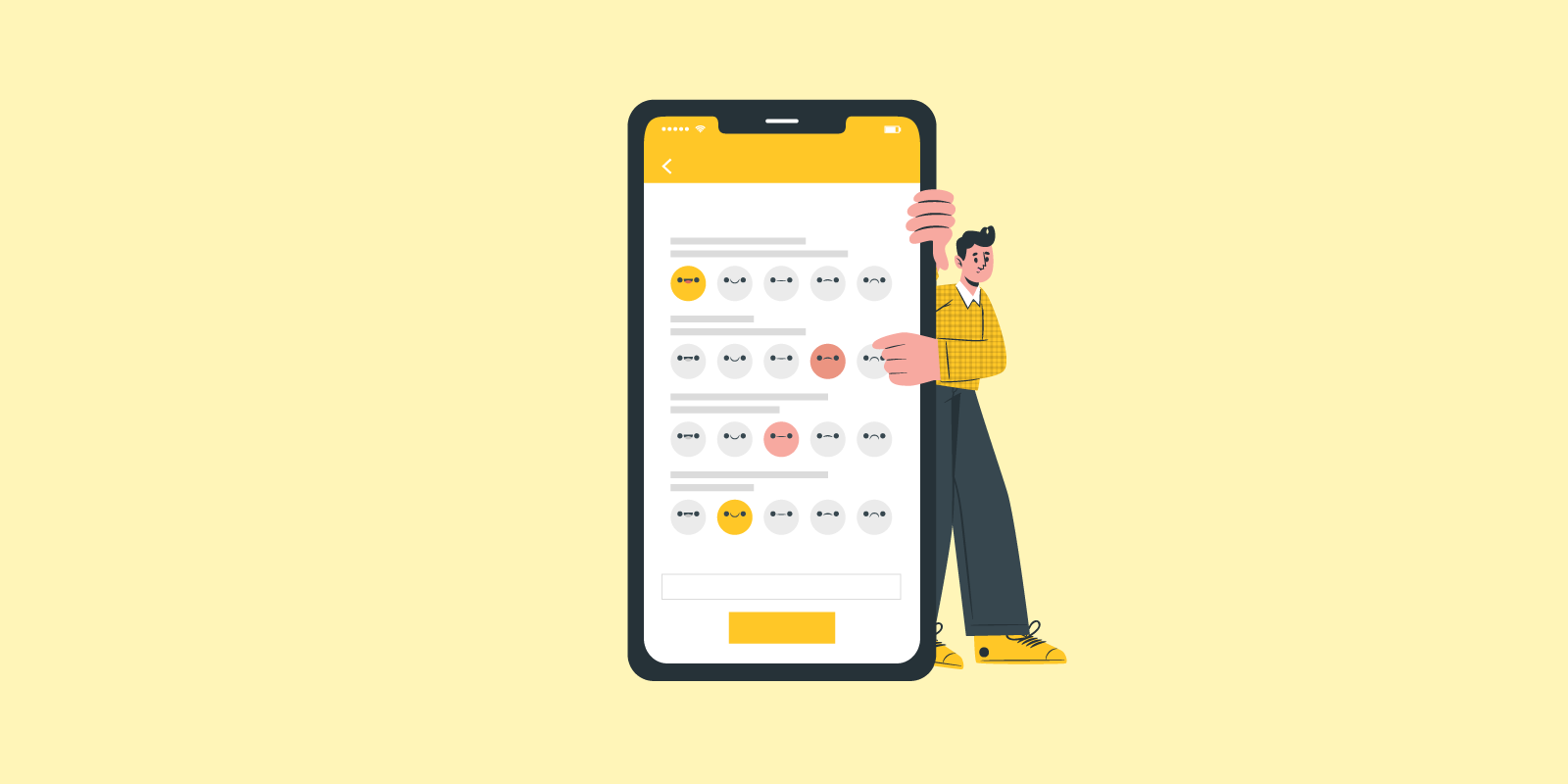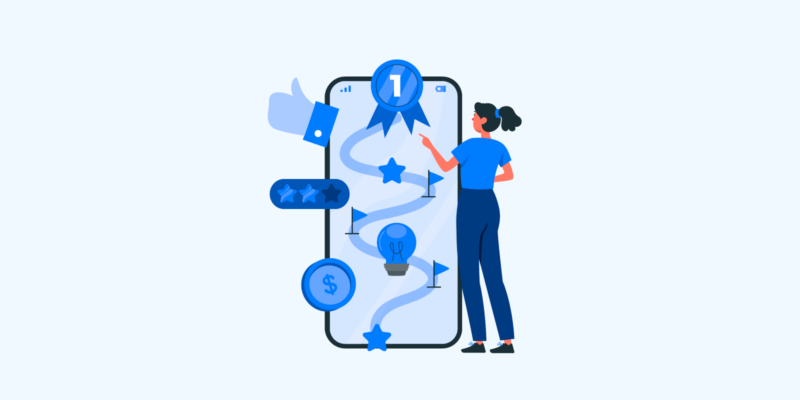If you’re a business owner looking to hook your visitors and turn them into loyal customers, adding a quiz to your website could be the game-changer you need. Picture this: a staggering 96% of people who kick off a Buzzfeed quiz stick around to hit the finish line. Moreover, 82% of people who saw a quiz on their social media feed decided to check it out.
Quizzes can do wonders, from helping shoppers choose the perfect product to gathering insights into your audience’s preferences. And let’s talk about standing out — with 88% of marketers betting on quizzes to give their brand that unique edge, it’s a strategy that’s both fun and fruitful.
Quizzes are a direct line to customer interaction, offering insights, personalization, and that spark that makes your brand memorable. And it’s your time to harness the power of this tool.
In this article, we will discover the different quiz ideas and explore successful examples from other companies so you can find inspiration for your own business.
Let’s go!
Why your website needs a quiz
Just in case you are still hesitant – let’s discuss what advantages a quiz can offer.
Adding a quiz to your website is like opening the door to a whole new way of connecting with visitors. It’s a game-changer for increasing user engagement because it turns passive scrolling into active participation.
Imagine each question in the quiz as a friendly chat that guides visitors through a journey, tailoring the experience just for them. This personal touch not only makes visitors feel special but can also lead them directly to products or services they’re likely to buy, giving your sales a real boost.
But that’s not all. While visitors enjoy your quiz, you get to collect valuable insights. Every click provides a clue about what they’re looking for and how you can serve them better. This kind of info is gold for shaping your offerings and making sure you hit the mark.
And the cherry on top? Quizzes help visitors bond with your brand. When they see that you’re offering a fun and personalized experience, they’re more likely to stick around, tell their friends, and come back for more. That’s how quizzes not only spark interest but can also turn a casual visitor into a loyal fan.
Here are some tasks that quizzes can help with:
- Collect Zero-Party Data: Implement quizzes as an engaging way for customers to share information about their preferences and needs directly with your brand. This creates a reliable dataset you can use for marketing that respects user privacy and adheres to the latest regulations.
- Enhance Conversion Rates: When a customer completes a quiz, use their responses to recommend products they are likely to buy. This tailored approach can significantly increase the likelihood of a sale, evidenced by higher conversion rates seen by brands using such strategies.
- Increase Average Order Value (AOV): Quizzes can cleverly suggest complementary products or bundles that cater to the quiz-taker’s specific interests and needs, enticing them to spend more per transaction, which raises the AOV.
- Expand Opt-in Lists: Entice quiz-takers to subscribe to your mailing or messaging lists by offering something of value in return, like personalized quiz results or exclusive content, which can lead to a larger pool of engaged potential customers.
- Improve Retention Through Personalization: Use the detailed preferences and interests gleaned from quiz data to create personalized communication, whether that’s through email, SMS, or social media. This can lead to more relevant and engaging experiences for the customer, increasing loyalty and repeat purchases.
- Inform Business Strategy: Analyze the data collected from quizzes to uncover trends and patterns in customer behavior and preferences. This can guide decisions on product development, content creation, and overall business strategy, helping to convert more site visitors into customers and meet market demands effectively.
So, a quiz isn’t just a tool; it’s an invitation to engage, discover, and come back time and time again. It’s also a tool that will help you optimize your business by gathering valuable insights from users.
Quiz ideas with examples
Quizzes are for sure a secret weapon for engaging and understanding customers. As we’ve seen their effectiveness, it’s time to dive deeper. Let’s explore the diversity of quizzes, unravel the benefits of each type, and discover how famous companies are harnessing their power to captivate their audience and drive business success.
1. Trivia Quiz
Designed to challenge participants’ knowledge on a range of topics, trivia quizzes can be a fun way to learn new facts or test existing knowledge. This type of quiz increases user retention and site interaction. It can position your platform as a knowledge hub, encouraging repeat visits and longer session times, which can translate to increased ad revenue and brand awareness.
This quiz type is perfect for media companies, educational platforms, and entertainment websites. A news site, for example, might use a current events trivia quiz to engage its readers.
Example: BuzzFeed uses this format to generate social shares with quizzes about pop culture. Trivia quizzes can also be used by publishers like National Geographic to engage users with geography or wildlife facts.

2. Personality Quiz
These quizzes categorize users into different personality types based on their responses. They engage users with personalized results. Businesses can use these insights to segment their audience for targeted marketing, increasing the effectiveness of their campaigns and customer satisfaction.
Personality quizzes are a hit on social media and dating apps and can range from lighthearted themes to more serious psychological evaluations. A lifestyle brand or a self-help website might use these to help visitors gain personal insights.
Example: Dating apps like eHarmony use personality quizzes to match potential partners, while career websites like Glassdoor may help users find their ideal job roles with career ideas quizzes. They’re also a tool for self-reflection on personal blogs or life coaching websites.

3. Lead Generation Quiz
Used strategically by businesses to gather potential customers’ information, lead generation quizzes are a staple in digital marketing. They capture potential customer information in an interactive way. This information can be invaluable for building a sales pipeline and nurturing leads through personalized follow-ups, boosting conversion rates.
Companies like real estate agencies, B2B service providers, or marketing firms use lead generation quizzes to qualify leads and build their sales funnels.
Example: HubSpot, a leader in inbound marketing, uses lead generation quizzes to segment users and offer tailored content, while a real estate company like Zillow might use quizzes to match clients with ideal properties.

4. Product Recommendation Quiz
E-commerce businesses implement these quizzes to direct customers to products they’re likely to purchase, enhancing user experience and increasing conversion rates. Providing tailored product suggestions to users increases sales by matching customers with products they’re likely to purchase, reduces the paradox of choice, and improves the customer shopping experience.
Beauty brands and fashion retailers often employ this type of quiz to tailor suggestions based on a customer’s style or needs. This is a good option to consider if you want to develop a product comparison and recommendation features on your website.
Example: Warby Parker’s quiz assists customers in finding the perfect frames for glasses. SkinCeuticals uses quizzes to guide users to the best skincare regimen for their needs and Sephora’s skincare quiz helps customers find personalized skin treatments.

5. Quiz Competition
These are gamified quizzes designed to foster competition among participants, often leading to rewards or recognition. It creates buzz and excitement around your brand. By fostering competition, businesses can increase engagement, attract new users, and potentially go viral, leading to increased brand visibility and loyalty.
Educational institutions, marketing campaigns, or corporate training programs might use quiz competitions to engage and motivate their audience.
Example: Duolingo, the language-learning platform, used quiz competitions to motivate users to practice more. Companies like Cisco might use competitions for cybersecurity training to keep IT professionals sharp.
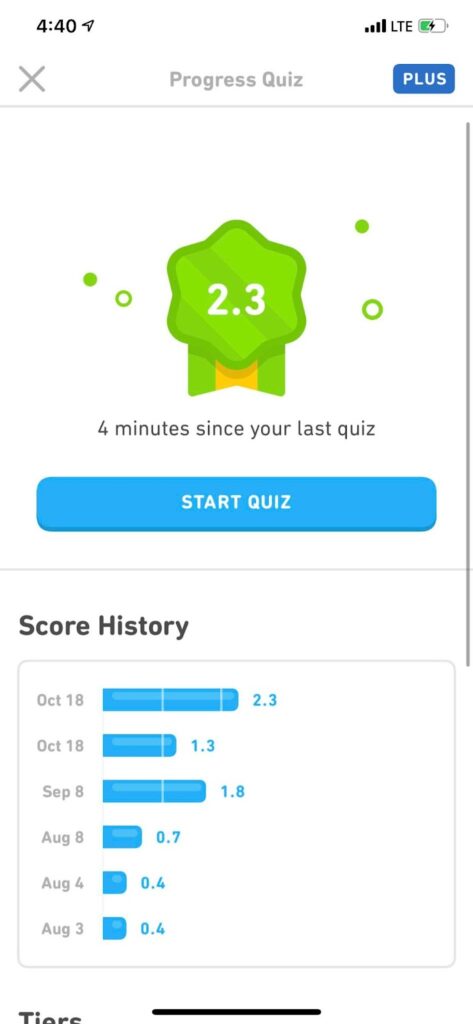
6. Buzzfeed-style Quiz
Buzzfeed has popularized this format, which is known for being fun, lighthearted, and often humorous. They offer entertainment that can lead to high levels of user sharing. Their viral nature can dramatically increase your brand’s reach and attract a younger demographic, often leading to a larger social media following.
Any company looking to boost engagement on social media or entertain their audience might use such quizzes. They’re especially useful for content sites looking to increase their viral content shareability.
Example: Primarily, BuzzFeed creates quizzes for fun. Funny quiz ideas and shareable format let them go viral on social media. Typical BuzzFeed quizzes might include titles like “Which ‘Friends’ Character Are You?” or “What City Should You Actually Live In?”

7. Assessment Quiz
These are formal quizzes used to evaluate knowledge or skills. They measure user knowledge or skills in a particular area. For educational platforms, this can help tailor content offerings and for businesses, it can aid in product development and user experience optimization.
Educational institutions, certification bodies, and online courses often use assessment quizzes to measure learning outcomes or proficiency.
Example: Coursera and Khan Academy use assessment quizzes to ensure that students understand the course material. Professional certification programs, like those offered by the Project Management Institute, also rely on assessment quizzes.

8. Multiple Choice Quiz
A versatile quiz format, multiple-choice quizzes are used across various industries, from educational testing to customer feedback surveys. They simplify the answering process for users. The format’s versatility allows for a wide range of data collection opportunities, from customer preferences to product feedback, useful for market research.
Companies might use them for training assessments, product feedback, or even market research.
Example: Woorise and Google Forms provide tools for creating multiple-choice quizzes, which can be used by businesses of all sizes for customer feedback, employee training, or market research.

9. Diagnostic Quiz
Often seen in the health, education, and consulting sectors, diagnostic quizzes help in identifying issues or determining the root cause of a problem. It helps users diagnose or understand an issue or need. Especially useful for health and wellness businesses, they can lead to increased trust and authority in the field, as well as direct product upselling.
A health website might offer a symptom checker quiz, while an educational app might diagnose learning styles.
Example: Mayo Clinic might use diagnostic tools to help users identify potential health issues before consulting a doctor, while Psychology Today offers a variety of diagnostic quizzes for mental health.

10. Scored Quiz
In this format, each answer adds to a cumulative score. This approach provides immediate feedback and gratification to users. Such quizzes can be used to certify knowledge, thereby creating a qualified user base for professional development platforms or services.
Language learning apps or competitive exam preparation websites often use scored quizzes to help users track their progress or prepare for tests.
Example: Language learning apps like Babbel score user progress through quizzes, while educational platforms like Quizlet use them for studying and learning new topics.

11. Live Quiz
Offering instant engagement, live quizzes are used by event organizers, educators, and broadcasters to interact with their audience in real-time. Such real-time engagement and community building create event-like engagement, boosting brand interaction and offering potential for sponsorships or partnerships.
They can be a feature of a virtual conference or a classroom tool.
Example: Twitch streamers or YouTube creators might use live quizzes during streams to interact with their audience. Educational tech companies like Kahoot! make live quizzes engaging for classrooms and corporate training.
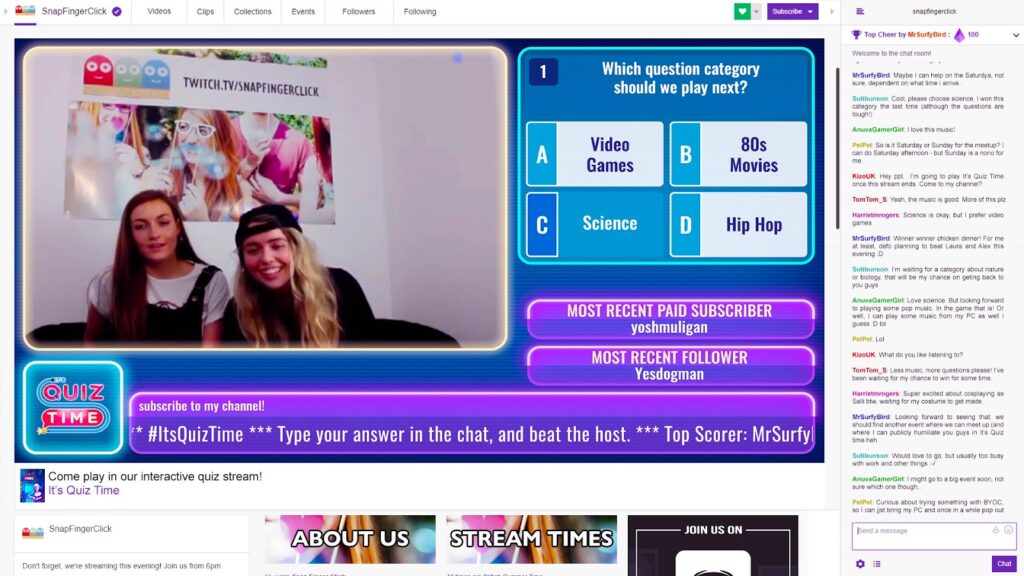
12. Matching Quiz
This type pairs items together based on their relationship and can be an effective educational tool. It aids in memory retention and learning. This can be especially beneficial for educational services or products that want to reinforce brand knowledge or product specifications.
Such quizzes can be used by an online learning platform to help students learn vocabulary or historical dates.
Example: A company like Ancestry.com might use matching quizzes to educate users on historical figures or family tree information. Educational apps for children also frequently use matching quizzes to teach language or math skills. The British Council utilizes this format to teach English online.
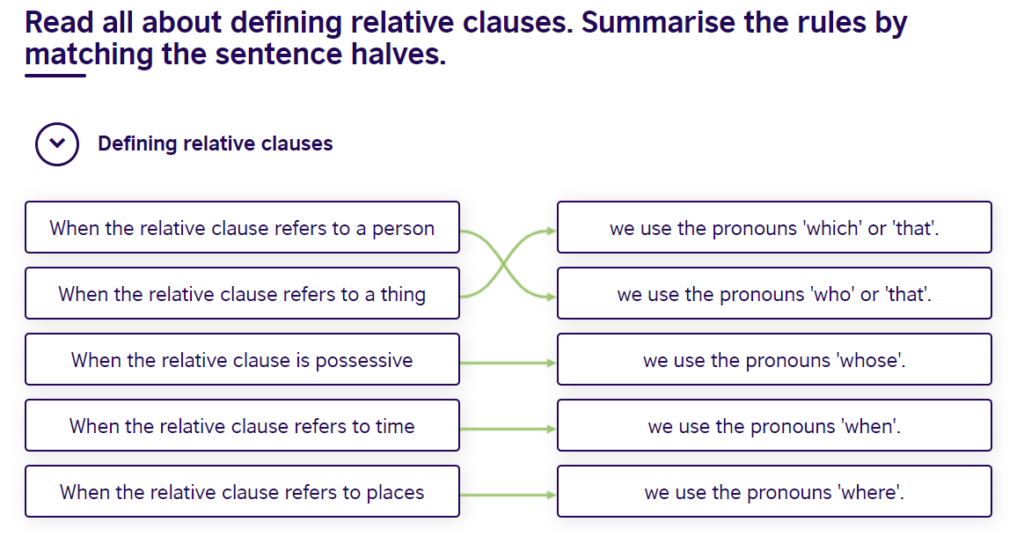
13. True/False or Yes/No Quiz
Because of their simplicity, these quizzes are widely used for quick assessments and straightforward user engagement. They can be effective tools for quick market research or to debunk myths related to a business’s industry, establishing the brand as a thought leader.
This type can be used by news sites to challenge readers’ understanding of facts versus myths or by healthcare sites to dispel common misconceptions.
Example: Fact-checking sites like Snopes could use true/false quizzes to educate readers on misinformation, while health organizations like the CDC might use them during public health crises to communicate important information.

14. Research Quiz
Research quizzes collect data on user knowledge, beliefs, or preferences. They provide businesses with rich, actionable insights that can inform product development, marketing strategies, and content creation.
Academic institutions and market researchers utilize this approach to collect data on various subjects, from consumer preferences to social trends. They’re also used for psychological studies or sociological surveys.
Example: Market research firms such as Nielsen may use quizzes to understand consumer behavior, while academic researchers might use them to gather data for social science studies.

15. Picture Quiz
Visual recognition quizzes are engaging and can be used in various contexts, from social media challenges to educational testing. These quizzes are also more accessible for different age groups.
Use of this type is not limited to social media and education. An art gallery might use a picture quiz to educate visitors about different art styles or artists. They are also suitable for e-commerce platforms to showcase products or for brands to enhance visual recognition among consumers.
Example: Art institutes like The Louvre could use picture quizzes to help visitors learn about different artists or art periods, while car dealerships might use them to help buyers identify models and features. At the same time, these quizzes are also used by Duolingo and BuzzFeed.
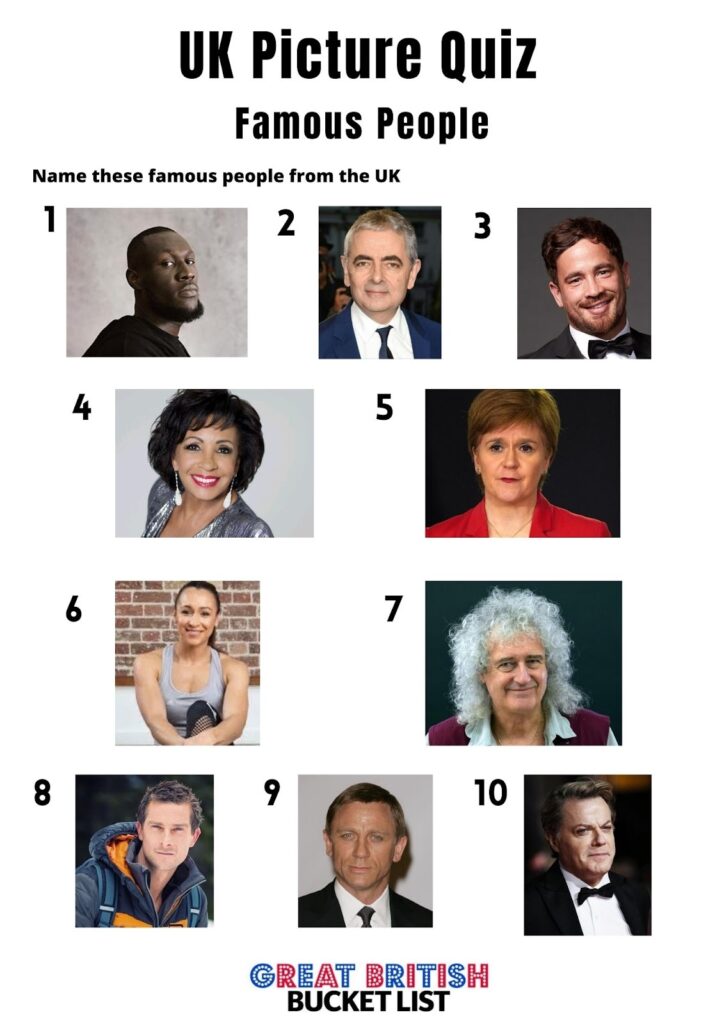
16. Video Quiz
This interactive format, often used by educational content providers, embeds questions in video content to enhance learning and retention. It enhances user interaction with multimedia content. Using this approach, businesses can increase engagement metrics on their content and gather precise data on consumer preferences and behaviors.
It can be an effective tool for online courses or employee training modules.
Example: TED-Ed creates educational videos with embedded quizzes for an interactive learning experience. Fitness apps might also incorporate video quizzes to gauge the effectiveness of workout tutorials or to quiz users on health and nutrition knowledge.

As you’ve seen, quizzes come in all shapes and sizes, each serving a unique purpose. You can choose what kind of quiz suits you depending on your industry and type of platform. For example, if you decided to make a language learning app the best options here might be assessment, scored or matching quizzes, while a website that sells cosmetics can implement a product recommendation quiz.
Conclusion
To wrap things up, it’s clear that quizzes are really powerful. They’re not just fun to do; they can do a lot for websites and businesses. Almost everyone who starts a quiz finishes it, which shows us how much people like them.
Look at successful quizz examples and ideas and play around with different kinds to see what works best for you and your audience. You might be surprised at how much a simple quiz can do to get people interested in what you’re offering.
So give it a go, make some quizzes, and have fun seeing how they can help you connect with others in new ways!
